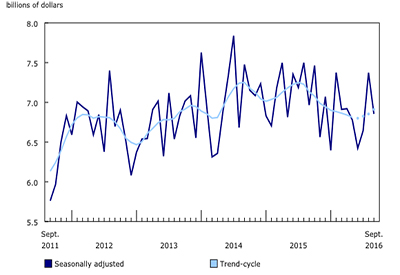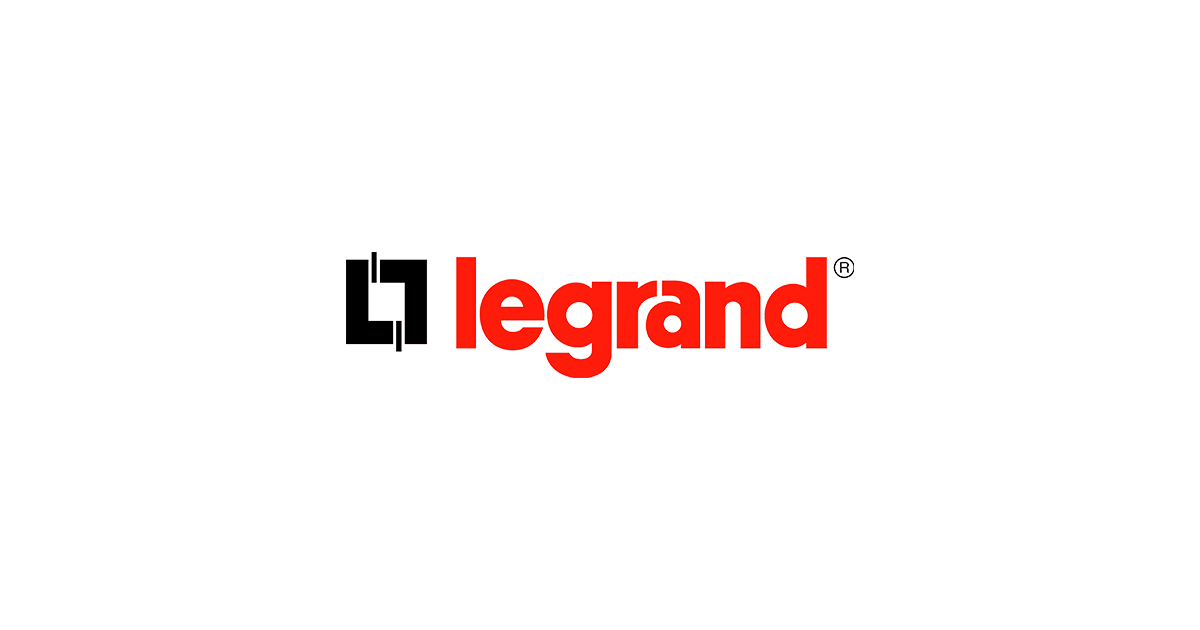Value of Building Permits Declines 7% in September

November 21, 2016
Municipalities issued $6.9 billion worth of building permits in September, down 7.0% from August. Quebec, British Columbia and Ontario recorded the largest declines. The overall decrease was attributable to lower construction intentions for non-residential buildings, led by commercial structures.
The value of non-residential building permits was down 22.3% to $2.2 billion, following two consecutive monthly advances. All three non-residential components — commercial, institutional and industrial — posted decreases, with commercial buildings registering the largest drop. Declines were recorded in every province except Newfoundland and Labrador. The most notable decreases occurred in Ontario and Quebec.
Conversely, in the residential sector, the value of permits delivered by municipalities increased for a second consecutive month, up 2.6% from August to $4.6 billion in September. Higher construction intentions for multi-family dwellings led the advance. Gains in Ontario and Alberta more than offset declines in six other provinces.
Non-residential sector: commercial buildings post the largest decrease
The value of commercial building permits posted the largest decrease, falling 20.8% to $1.2 billion in September, following three consecutive monthly increases. The decline was largely attributable to lower construction intentions for retail complexes and office buildings. The value of commercial building permits was down in every province except Newfoundland and Labrador. The most notable decrease was recorded in Ontario, followed distantly by British Columbia and Alberta.
In the institutional component, the value of building permits was down 22.3% to $636 million in September, as a result of lower construction intentions for universities and, to a lesser extent, retirement homes. Seven provinces posted decreases, led by Quebec, with British Columbia and Ontario a distant second and third. In contrast, Alberta recorded the largest increase.
The value of industrial permits fell 27.1% compared with August to $361 million in September. The decline stemmed from lower construction intentions for utilities buildings, transportation terminals and maintenance-related buildings. The value of industrial building permits was down in eight provinces, with Ontario, Manitoba and Alberta recording the most significant declines. The largest advance occurred in British Columbia.
Chart: residential and non-residential sectors

Residential sector: Multi-family dwellings record the largest gain
The value of permits for multi-family dwellings recorded the largest gain, up 3.7% to $2.0 billion in September. This was the third consecutive monthly increase. The advance was driven by higher construction intentions for rental-apartments and was moderated by a decline in apartment-condominiums. Gains in Ontario and Alberta more than offset decreases in six provinces, the largest of which occurred in British Columbia.
In the single-family dwelling component, municipalities issued $2.6 billion worth of building permits in September, up 1.8% from August. Six provinces contributed to the gain, with Ontario recording the largest increase.
Municipalities approved the construction of 17,104 new dwellings in September, up 2.5% from the previous month. The rise was mainly attributable to multi-family dwellings, up 3.9% to 11,094 new units. Single-family dwellings edged up 0.2% to 6,010 new units.
Provinces: Largest declines in Quebec, British Columbia and Ontario
The total value of building permits was down in eight provinces in September, with Quebec, British Columbia and Ontario leading the decline.
In Quebec, the value of building permits fell 14.7% to $1.2 billion in September. Decreases were posted in every component, except single-family dwellings. The decline was largely attributable to lower construction intentions for institutional structures.
The value of permits in British Columbia decreased 13.3% to $996 million in September, the third decline in four months. Lower construction intentions for multi-family dwellings and, to a lesser extent, institutional and commercial buildings were responsible for the decline.
In Ontario, the value of permits was down 4.3% to $3.0 billion in September, following two consecutive monthly gains. Decreases were observed in all of the non-residential components, led by commercial buildings. Higher residential construction intentions, most notably for multi-family dwellings, partially offset the provincial decline.
Conversely, Alberta and Newfoundland and Labrador posted gains. In Alberta, the value of building permits increased 10.4% to $1.1 billion in September. Higher construction intentions for multi-family dwellings and institutional structures more than offset declines in every other component. The value of building permits was up 39.6% in Newfoundland and Labrador, following three consecutive monthly declines. Although the advance was spread across all components, multi-family dwellings accounted for more than half of the rise.
Census metropolitan areas: Montreal posts the largest decline
In September, the total value of building permits was down in 21 of the 34 census metropolitan areas. Montreal recorded the largest decline, followed by Toronto and Vancouver.
The value of building permits in Montreal fell 36.5% to $545 million, following a 69.5% increase the previous month. Lower construction intentions were recorded in every component, led by institutional structures and multi-family dwellings.
In Toronto, the value of permits declined 11.2% to $1.5 billion in September, following three consecutive monthly increases. Lower construction intentions for commercial buildings and, to a lesser extent, industrial buildings were responsible for the decline.
The value of building permits in Vancouver fell 20.0% to $521 million in September, the third decline in four months. The decrease was the result of lower construction intentions for multi-family dwellings and commercial buildings.
In contrast, the value of permits in Hamilton rose to $251 million in September, more than twice the value in August. This was the fourth increase in five months. Higher construction intentions for multi-family dwellings, led by apartment-condominiums, and for commercial buildings were responsible for the advance. In Calgary, the value of building permits increased 28.6%, largely as a result of higher construction intentions for rental apartments.
Source: Statistics Canada, http://www.statcan.gc.ca/daily-quotidien/161108/dq161108a-eng.htm.















